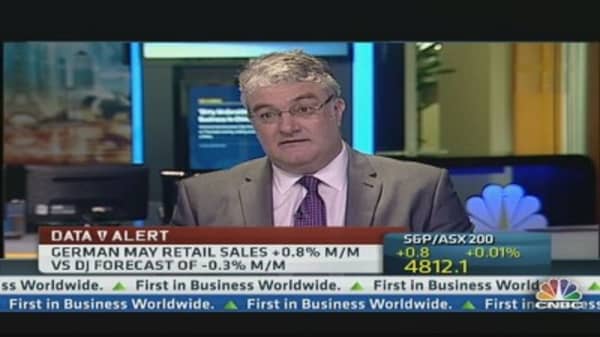That's why every one of the dozen or so Germans I have spoken with—from a wealthy real estate developer in Berlin, to a retired construction contractor in Villingen-Schwennigen, to members of my extended family living near Pforzheim, continue to support the euro.
To understand why, you have to look to the heart of the economy in this region of southern Germany: small and midsize manufacturing, known here as the Mittelstand (midsize company). It's a business that's slowly disappearing in the United States: thousands of small companies (of 20 to 500 employees) in auto construction, electronics, optics, metallurgy, and clockmaking, to name just a few. What they all have in common is that particular German genius: precision engineering.
Here's the key fact: About 40 percent of all this industrial output is exported.
(Read More: Should Merkel's Green Jacket Make Greeks See Red?)
That's why Germans who shrug when I ask about the ECB back the euro: They believe it has helped make them even more competitive against their fellow Europeans.
Every German I have spoken with is very careful not to accuse Southern Europeans of being lazy, but it's clear they all believe that the German willingness to work harder than everyone else is at the core of this country's post-war success.
And that's why most people here are conservative and continue to support Merkel, even though they may think she's somewhat colorless and prone to flip-flop on many issues.
That support is starting to shift, however, because politics is changing. Baden-Württemberg's Landtag (state assembly) has been controlled by the center-right Christian Democrats since the state was created in 1951. But not anymore.
Here's two ways you can tell the old party politics matter less: A Green Party-led coalition won control of the state assembly two years ago, and on the night I was visiting my relatives in a village near Pforzheim, the local meeting hall was packed with voters who wanted to hear the five candidates for Burgomeister (mayor), four of whom had no party affiliation.
My cousins talked enthusiastically about Green politics, which have finally entered mainstream thinking after gestating for 40 years.
(Read More: Euro Divides, 'Violent Revolution' May Loom: Critic)
They said the old party lines—the wealthy and upper middle class supporting center-right parties like the Christian Democrats, and the workers backing center-left parties like the Social Democrats—are starting to dissolve. Many perceive that both parties have run out of ideas.
But don't kid yourself. There might be plenty of energy for "going Green," but when I asked a cousin what was foremost on the minds of local citizens, he didn't hesitate to answer—jobs. It's a pretty simple equation: Support for the euro is higher in high-employment regions like Baden-Württemberg than it is is high-unemployment regions like the former East Germany.
And it is on that statistic—job growth—that the future of the euro is likely to be settled. Even in Germany.
—By CNBC's Bob Pisani












